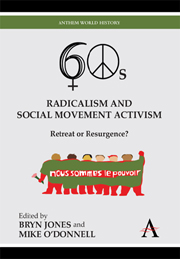Book contents
- Frontmatter
- Contents
- Introduction Sixties Radicalism: Creating Spaces and Leaving Legacies
- PART I Radical Movements Around the World
- PART II Theoretical & Cultural Significance
- PART III Social Movement Legacies
- Conclusion
- Resurgence? The Legacy of the Sixties to Contemporary Social Movements
- Notes on Contributors
- Author Index
- Subject Index
Resurgence? The Legacy of the Sixties to Contemporary Social Movements
from Conclusion
Published online by Cambridge University Press: 05 March 2012
- Frontmatter
- Contents
- Introduction Sixties Radicalism: Creating Spaces and Leaving Legacies
- PART I Radical Movements Around the World
- PART II Theoretical & Cultural Significance
- PART III Social Movement Legacies
- Conclusion
- Resurgence? The Legacy of the Sixties to Contemporary Social Movements
- Notes on Contributors
- Author Index
- Subject Index
Summary
Introduction
This book began by contrasting polarised interpretations of the longer term impact of sixties radicalism. One cluster sees cultural, social and political rebellion as ephemeral, politically inconsequential or absorbed into the mainstream. Others see legacies and practices from sixties radicalism as established and still influential in contemporary radical protest. This divergence is illustrated by the views of two Americans: Noam Chomsky (2009) and Gerard DeGroot (2008). On the BBC world news programme Hardtalk (November 3 2009) Chomsky consistently attributed what he sees as an increase in freedom of expression in American public life to the long-term impact of the radical actions of the nineteen sixties and particularly emphasised the role of young people. He cited the protests against the Iraq War as subject to less harassment than the anti-Vietnam War protests. A life-long ‘sceptic’ of the corrupting effects of power, Chomsky upholds protest as a continuous part of democratic life – a view once expressed even more forcefully by Thomas Jefferson in the phrase ‘God forbid that we should ever be twenty years without … a rebellion’ (quoted in Rosen 1969, 2). But is it possible to maintain such a perception of protest as process, a necessary and continuous part of a free society in an age when the great meta-narratives of the left are said by some to be ‘exhausted’ (Bell, 1988; Lyotard, 1984)?
Despite some intemperate commentary the substance of Gerard DeGroot's recent critique of the radical sixties nevertheless typifies the negative pole of assessment.
- Type
- Chapter
- Information
- Sixties Radicalism and Social Movement ActivismRetreat or Resurgence?, pp. 225 - 240Publisher: Anthem PressPrint publication year: 2010

